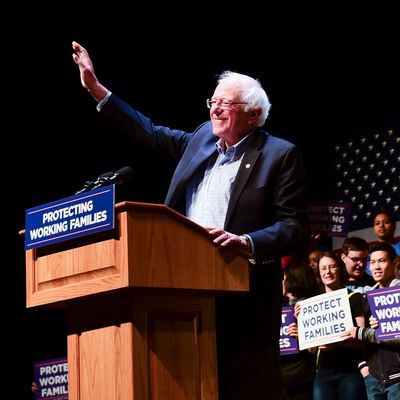
The Democratic Party’s official mission is to win elections for its candidates — and “a better deal” for American workers. Strengthening America’s labor unions would advance both of those goals, simultaneously.
Over the past four decades, America’s private-sector unionization rate has collapsed — along with labor’s share of productivity gains. A large and growing body of economic research has demonstrated that this is no coincidence: Unions don’t just grow paychecks for their members, but also put upward pressure on wages throughout their industries. The Economic Policy Institute estimates that weekly wages for private-sector male workers would be 5 percent higher today, were America’s unionization rate still as high as it was in 1979 (changes in the prevalence of gender wage discrimination and female participation in the workforce complicate the comparison for working women). Back then, 34 percent of private-sector workers belonged to a union; today, just 10.7 percent do.
If Democrats want to give workers a better deal, there are few better things they can do than promote unions (i.e., organizations that were invented to do just that).
Alternatively, if Democrats decide that they don’t actually care about helping workers — and their sole policy goal is to pass laws that make it easier for them to win elections — there are few better things they can do than promote unions.
In recent years, a number of Republican-controlled states have passed “right-to-work” laws — measures that undermine organized labor by allowing workers who join a unionized workplace to enjoy the benefits of a collective bargaining agreement without paying dues to the union that negotiated it. This encourages other workers to skirt their dues, which can then drain a union of the funds it needs to survive. And that has the effect of draining the Democratic Party of the funds — and grassroots organizing — that it needs to thrive: A recent study from researchers at Boston University, Columbia, and the Brookings Institution found that when a state passes a right-to-work law, the Democratic Party’s share of its presidential vote drops by an average of 3.5 percent. For Democrats, promoting unionization isn’t just the “progressive” thing to do; it’s also the pragmatic one.
This week, 14 Senate Democrats signaled that they understand this. On Wednesday, Bernie Sanders introduced the Workplace Democracy Act, a bill that aims to increase America’s unionization rate by:
• Allowing workers to form unions simply by collecting signatures in favor of unionization from a majority of their colleagues, instead of holding elections, which provide employers with the opportunity to lobby against the union before ballots are cast.
• Requiring companies to bargain with a new union within ten days of receiving a request.
• Nullifying right-to-work laws, by requiring workers to pay some amount of dues to unions that bargain on their behalf, regardless of the state they live in.
• Drastically increasing penalties on employers that illegally fire workers during union drives.
• And expanding the definition of “employee” so that America’s growing population of contract laborers — like the “gig economy” workers who power Uber and Lyft — can access the wide array of mandatory benefits that only employees can currently claim (including the right to collective bargaining). Specifically, the bill stipulates that a company’s workers are “employees,” unless the services they provide are “outside the usual course of the employer’s business” (so, a hardware store can hire a plumber to fix its toilets on contract, but a plumbing service would need to employ said plumber, if it wishes to avail itself of his or her services).
Thirteen of Sanders’s Democratic colleagues have signed onto this legislation — including virtually every suspected 2020 hopeful in the upper chamber (Cory Booker, Kirsten Gillibrand, Elizabeth Warren, and Kamala Harris are all represented). And yet, a wide array of (self-identified) progressive senators — including ones from states with strong labor presences — have not signed onto the bill.
It’s possible that these legislators simply haven’t gotten around to it — there is a lot going on right now, and this bill isn’t gonna come up for a vote any time soon. It’s also possible that they object to some little detail in this proposal but are hard at work at their own labor bills.
But if 35 Senate Democrats have no intention of supporting comprehensive labor-law reform of any kind, then 35 Senate Democrats are so deeply committed to protecting the ability of employers to exploit their workers, they’re willing to put their party at an electoral disadvantage for the sake of abetting such exploitation. There’s little reason to believe that this actually the case. But those who haven’t signed onto Sanders’s bill would do well to clarify that it isn’t, posthaste.






























